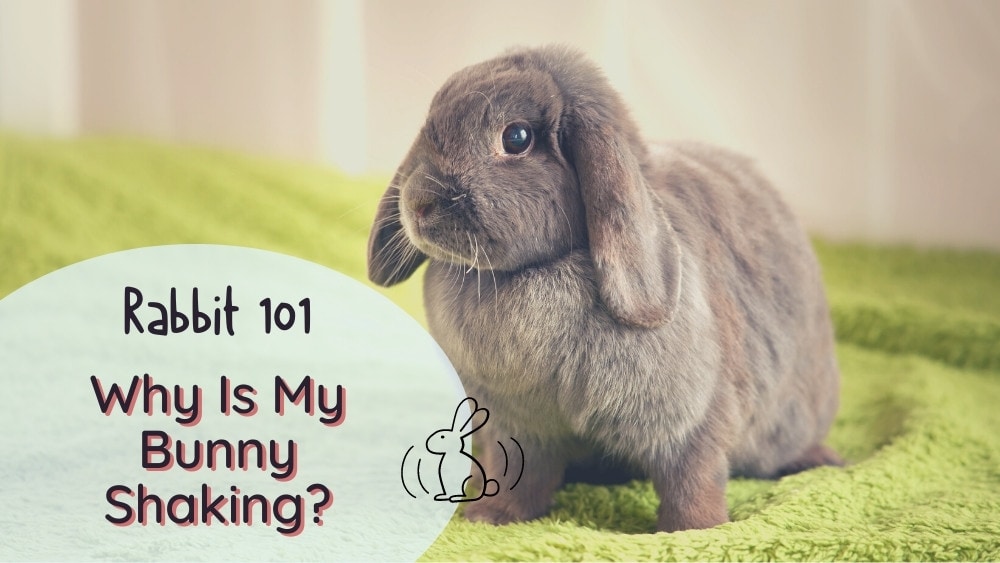Bunnies are lovable pets and they have unique ways of expressing their feelings, from cute actions like binkying and running in circles to digging. However, there are behaviors that could make an owner confused and nervous and these should not be ignored. One is them is shaking.
Rabbit shaking is one of the behaviors you may observe as a rabbit owner. Rabbits may shake, twitch, tremble or convulse for various reasons. It is important for you to understand your pet’s body language so that you can tell when something is not right.
This guide covers all the necessary veterinary-approved information you need to know about rabbit shaking, including:
- Why does a rabbit shake?
- Different types of rabbit shaking
- Reasons why rabbits shake and what to do
Why Is My Rabbit Shaking?
Rabbits shake for various reasons, ranging from harmless ones like excitement, to worrisome ones like fever and health problems. These can include ear infections, ear mites, and GI stasis. If your rabbit is shaking across its whole body, doesn’t seem like their usual self, or shows other symptoms, get them to a vet immediately.
Different Types of Rabbit Shaking
You may observe your pet rabbit shaking due to a variety of reasons. Thankfully, not all kinds of shaking in rabbits are a cause for concern. Here is a list of the different types of rabbit shaking, the normal and the abnormal.
Twitching
This is a short, repetitive, jerky kind of shaking. Sometimes you may observe your bunny twitching all over while other times, the twitching is confined to one part of its body.
Rabbit twitching falls under normal rabbit behaviors, as long as it’s not prolonged and frequent. For instance, you will notice that your bunny twitches its rump when you offer it a tasty treat.
Rabbits may also twitch while they sleep. This is caused by their muscles relaxing and contracting involuntarily and is nothing to worry about.
Rabbit trembling or vibrating
Sometimes, if you look closely enough, you may see your bunny gently shaking all over. Trembling or gentle vibrations are normal bunny behavior. Additionally, rabbits vibrate or tremble slightly during sleep.
However, if you notice your rabbit vibrating forcefully, this may be a cause for concern and you should discuss your rabbit’s shaking with a vet.
Skin rippling
A rabbit’s fur or skin may ripple due to small air currents, and rabbits may also ripple their fur as a reflex when they are pleased or excited.
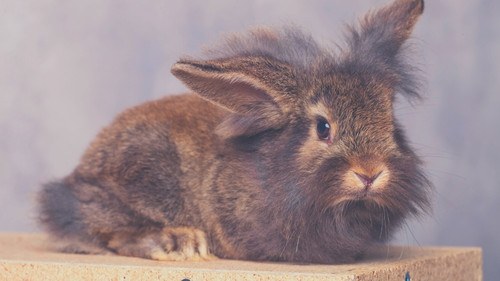
The fur appears wavy and moves in a certain pattern. This is probably the rabbit version of having a shiver run up the spine, and it sometimes causes the bunny to jolt. This is also normal bunny behavior.
Convulsing
Convulsions, seizures, or fits are a type of sudden, violent, and irregular rabbit shaking caused by involuntary muscular contractions.
Convulsions may last for several minutes and are not normal bunny behavior.
If you find your rabbit lying down and shaking, you should take them to see a vet immediately.
In any species, convulsions or seizures can damage the brain if they are not controlled quickly, so if the seizure doesn’t settle within 1-2 minutes you should be on your way to the vet clinic rather than waiting any longer.
Rabbits shaking their heads
Rabbits may shake their heads to show annoyance, while playing or when excited. However, it can also be a symptom of teeth or ear infections. Rabbits sometimes hold their head tilted to one side if they have an infection, but not always.
If your rabbit starts shaking its head from side to side for an extended period, there may be a problem, and you should see a veterinarian immediately.
Rabbit head bobbing
Rabbits sometimes bob their heads up and down. This is not a cause for alarm. Rabbits bob their heads when exploring a new environment, particularly to gauge height and depth.
They may also do this when they are happy or sleepy, the same way a human nods off while sleeping. However, frequent or prolonged head bobbing in rabbits may be a sign of illness.
Reasons Why Rabbits Shake and What to Do
Now you know the various types of shaking, those considered normal and others that are not. Now what? Here is a list of why you may have a shaking rabbit and what to do in each case.
Fear
Rabbits are prey animals and may shake and tremble when they are frightened by other animals, like birds, dogs and other predators. In fact, fear is one of the foremost causes of shaking in bunnies.
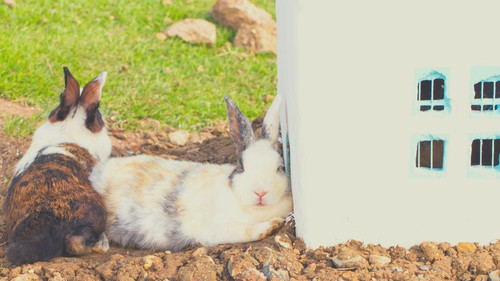
You can tell when a rabbit is scared from its body language. Its body will tense and its eyes may go wide. Additionally, you may find scared rabbits vibrate their noses.
Loud noises, bright lights, sudden movements, and changes in the environment may scare a rabbit and cause it to shake till it calms down.
What to do?
If your rabbit is shaking due to fear, the best thing to do is to leave them in their hutch or cage, and try to put distance between them and the loud noises, bright lights, dogs, or other factors which may have scared it. Avoid picking your bunny up, as this may worsen the situation, especially if it is not used to being held.
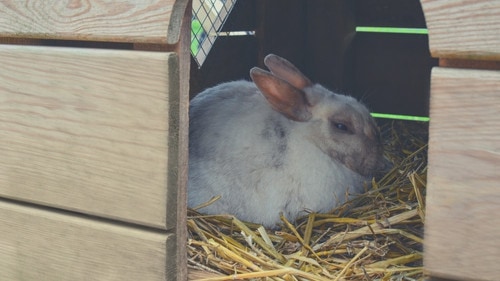
Placing a blanket over half of the hutch or cage, whilst still allowing enough space for air flow, can give the bunny a sense of security and protection. This is particularly useful when the scary event is something you can’t control or relocate, such as fireworks.
Stress
Stressed rabbits may also twitch or shake. A new environment e.g. a new cage or house, discomfort, and loud noises may stress a rabbit. Bunnies may also be stressed when unneutered or unspayed rabbits try to mount them to assert their dominance. Insufficient food or water, loneliness, and heat can also stress a rabbit severely.
Signs of a stressed and angry rabbit include not wanting to be touched or unnecessary aggression. It may also pant or grunt and lose interest in food.
What to do?
Keeping your rabbit in a quiet place will help ease stress. Provide enough food and water and remove all causal agents of stress. If your rabbit doesn’t have a companion, consider getting them a friend, as social interaction is an important part of rabbit welfare.
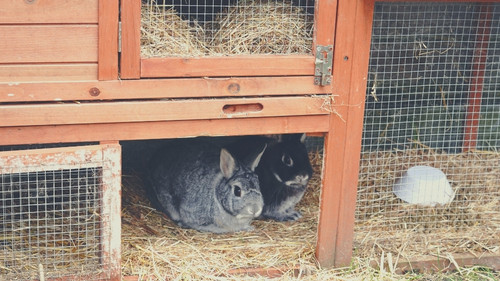
Conversely, if they are with other rabbits, try to observe their interactions and check nobody is being bullied.
Hiccups
Rabbit hiccups are a relatively harmless cause of shaking in rabbits. They may last for several minutes and can be quite distressing for your rabbit.
They are more common in young rabbits but can occur in rabbits of all ages. Additionally, eating too fast can make an adult rabbit hiccup. Rabbit hiccups usually stop on their own and don’t require intervention.
What to do?
As with humans, there’s not a lot you can do to help your rabbit’s hiccups pass. Offer some water, and you can gently rub or caress your bunny’s back if that seems to keep them calm.
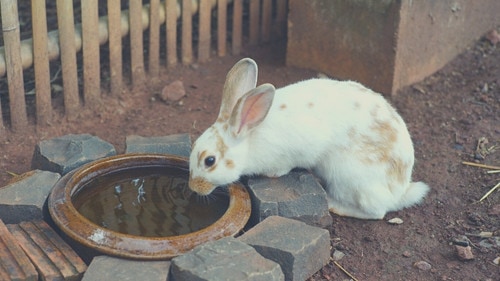
If your rabbit is experiencing hiccups on a daily basis, or their bouts of hiccups persist for more than a couple of hours, consult your vet.
Ear mites
Frequent head shaking in rabbits is often due to ear mites. An ear mite infestation may also cause a bunny to tilt its head frequently and scratch at the affected ear. Ear mites are common in pet rabbits, especially in long-eared breeds like the English lop and dwarf lop.
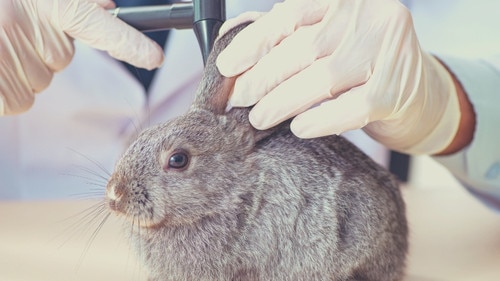
What to do?
Check to see if you can find any mites crawling in your rabbit’s ears. You can also look out for other signs like crusty ears, hair thinning, weight loss, and droopy ears. If you find any of these symptoms, consult your vet for treatment.
Ear infections
Head shaking is a common sign of ear infections in rabbits. These infections usually involve a bacterial infection that moves into the ear after a build-up of ear wax or an infestation of ear mites.
What to do?
Watch out for signs of ear infection such as pronounced head tilting, head shaking, and itchy ears. Seek immediate medical attention.
Although ear infections typically affect the outer part of the ear, they can sometimes cause inflammation of the middle and inner ear, which can cause your bunny to go deaf if left untreated. Your vet can have a look in the ear canal and check for blockages or infections.
Parasites
Rabbits are susceptible to parasitic infections. Common rabbit parasites include fur mites, burrowing mites, fleas, ticks, and worms. Fleas are not common in house rabbits, but if your bunny has access to your yard, it may get some from there.
As you can imagine, these parasites are very itchy, as they irritate the rabbit’s skin. Skin rippling, twitching, and sudden movements are all common with skin parasite infestations.
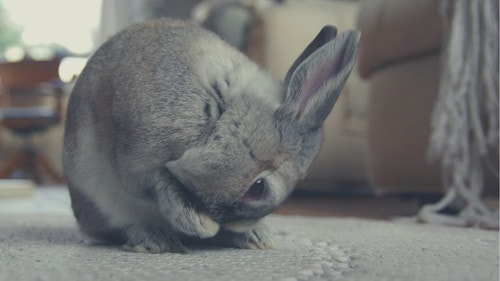
If a rabbit is infected with fur mites or burrowing mites, it will continuously scratch at the affected area. Additionally, you may notice some hair loss.
What to do?
Treat your rabbit and other house pets with a flea or tick treatment. If you have other pets, treat them all at the same time.
Consult your vet to recommend a safe treatment for rabbits if you do not know which one to use. Additionally, take steps to eliminate parasites from your home.
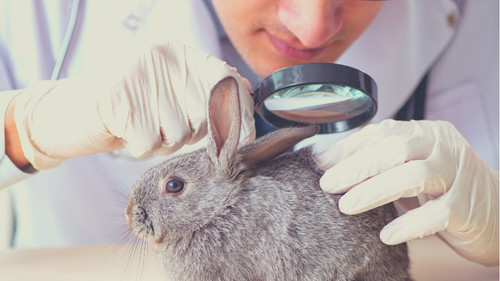
Neurological problems
Neurological issues affect a rabbit’s ability to control its movement.
Parasites like E. cuniculi affect a rabbit’s nervous system and cause head tilt or complete paralysis.
Head bobbing or frequent twitching can also be signs of neurological problems.
What to do?
Observe your pet bunny for signs such as bumping into objects and not being able to run in a straight line without falling over.
If you notice these, or other abnormal behaviors such as a prolonged head tilt or shaking, seek veterinary treatment.
Food poisoning
Rabbits naturally have a good sense of smell that helps them identify what foods to eat and which not to. Wild rabbits use their sense of smell often to find food. Pet rabbits on the other hand don’t need to do as much as their owners take care of them. This is why they may sometimes eat contaminated foods.
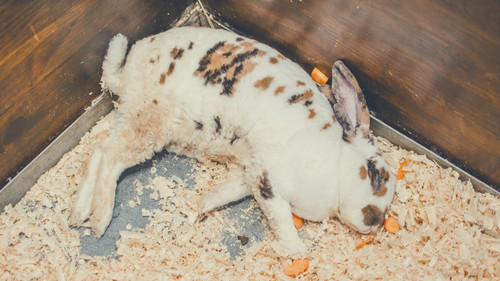
Food poisoning causes rabbits to lie on their sides or bellies and shake.
Foods like avocadoes, fruit seeds, potatoes and raw onions can poison rabbits or even kill them. Other symptoms of food poisoning include abdominal pain, lethargy, and loss of appetite.
What to do?
If you suspect that your bunny is suffering from food poisoning, remove it from the source of the poisoning. Treatment will depend on what food your rabbit has ingested. Consult your vet for emergency treatment.
Once your pet rabbit has been cleared to go home, place it in a quiet area and provide plenty of drinking water while it recovers.
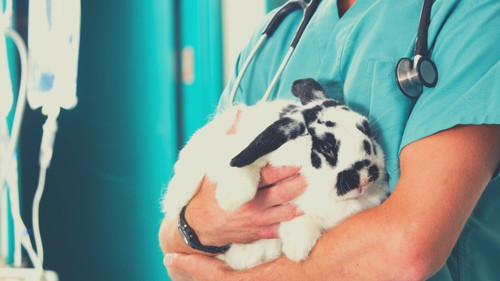
Keep your rabbit’s environment clear of strange plants and only feed it familiar foods to prevent food poisoning.
Toxic plants
Many houseplants and herbs like anemone, azalea, foxglove, ivy, and rhubarb are poisonous to rabbits.

If your rabbit has unrestricted access to your yard, shaking may be a telltale sign that it may have consumed some poisonous plants. This may be fatal if not treated immediately.
What to do?
Check your bunny for signs of poisoning such as lethargy, abdominal pain, high temperature, and breathing problems. Take your pet to a vet immediately.
Gastrointestinal stasis
Gastrointestinal stasis is a situation in which a rabbit’s digestive system slows down or is completely blocked because of problems with its natural gut flora.
This is usually a result of feeding your bunny the wrong diet especially one low in fiber. It can cause a rabbit to lie on its side and shake.
Symptoms of GI stasis include decreased appetite, lethargy, abdominal pain, bloated stomach, and reduced quantity of poop.
What to do?
Change your rabbit’s diet to one rich in fiber. A rabbit’s diet should be made up of 80-90 % hay and 10-20% rabbit pellets, fresh vegetables, and fruits. Visit a veterinarian if symptoms become severe.
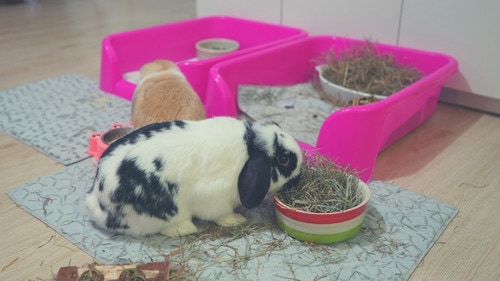
High-temperature
Rabbits do not tolerate high temperatures and are at risk of developing heat stroke during hot weather. They tolerate cold weather better than hot. This is especially true for outdoor rabbits in summer.
Temperatures over 80 degrees Fahrenheit or 26 degrees Celsius may be distressing for a rabbit. High temperatures can cause a rabbit to shake or tremble.
Bunnies cannot regulate their temperature by sweating, instead, they lose heat by dilating blood vessels on the surface of the ears.
It is essential that bunnies do not overheat as this can result in convulsions and death. Other signs of heatstroke in rabbits include salivating, panting, lethargy, and reddening of the ears.
What to do?
If a rabbit is overheated, you should aim to cool it down. An outdoor rabbit should be brought inside the house and kept in a cool room.
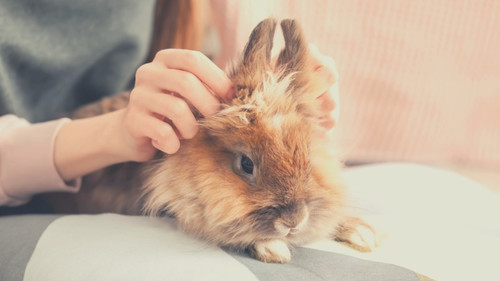
Gently dampen your rabbit’s fur by running wet fingers through the fur. Avoid bathing or wetting the whole rabbit as this can be stressful for the rabbit.
If your bunny doesn’t stop shaking within a couple of minutes, or continues to show signs of heat exhaustion, consult your vet immediately.
Stroke
Trembling is one of the first signs of stroke in rabbits. Other signs include drooling, side-to-side eye movement, and abnormal movements such as moving in circles.
What to do?
Seek immediate veterinary attention to avoid permanent damage. Nurse your rabbit through difficulties associated with a stroke. These include the inability to move, eat or drink. Hand feed it and manually express its bladder if it is severely paralysed.
Conclusion
There are a lot of reasons why your rabbit might be shaking – ranging from normal behavior and body language, through to potentially life-threatening conditions. Knowing whether your rabbit shakes are due to excitement or annoyance, or an underlying condition like GI stasis, food poisoning, or parasitic infection, is vital to be able to give them the care they need.
If you are uncertain of the cause of your rabbit’s shaking, getting checked by a vet is the best next step. Rabbits can go downhill quickly if not treated.
If you have found this article useful, please share it with your fellow rabbit owners and if you have further questions about your pet, leave them in the comments section below.


